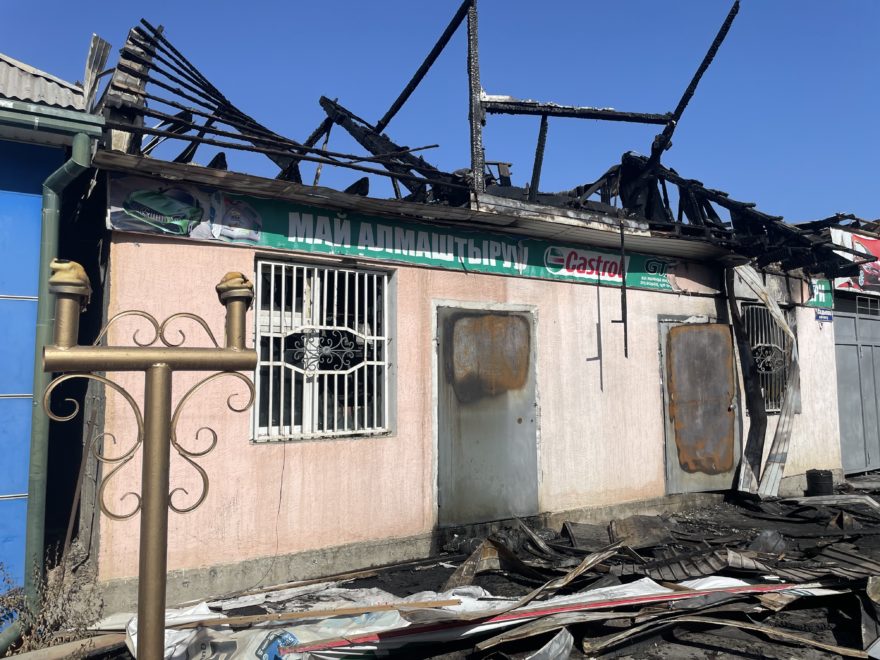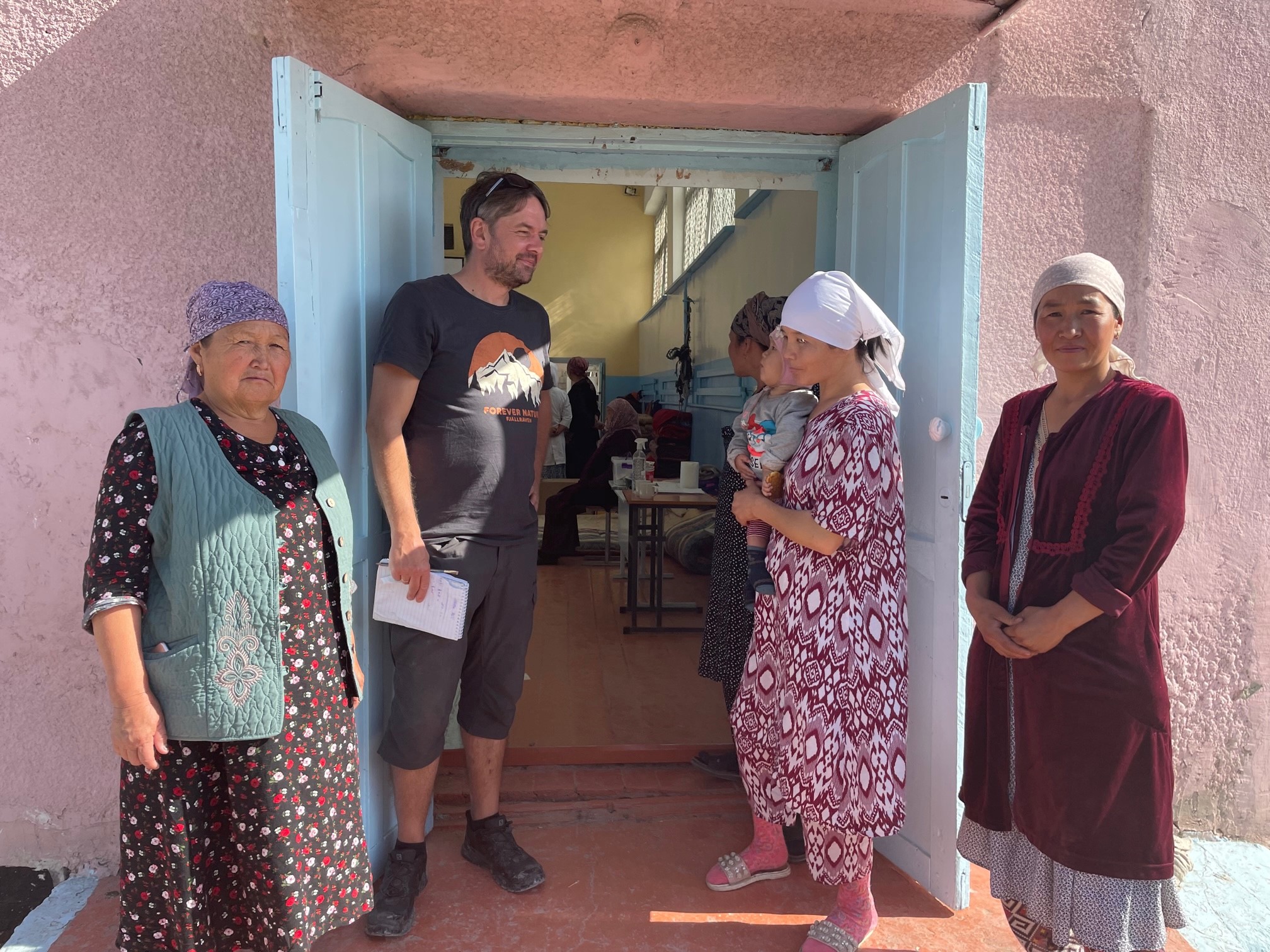On 14 September, and throughout the following days, violent clashes broke out in the border area between Kyrgyzstan and Tajikistan. While official numbers vary considerably, some sources claim up to 100 people were killed. According to Kyrgyz authorities, 136,000 people were evacuated from the area, where many residential houses were damaged or destroyed in the course of these dramatic events.
The NHC arrived to Batken a week after the clashes and visited a school in the outskirts of the regional capital, where many IDPs from the conflict zone had been housed. those temporarily living in the school were several children.
It is not the first time clashes break out between Tajik and Kyrgyz forces. Over the years, exchange of fire between border guards and outbreaks of violence between local residents has occured sporadically. In 2021, around 50 people were reportedly killed in similar circumstances. The events of September 2022 are the most serious so far, but this does not exclude a future conflict becoming even more dangerous for the region.
-Speaking with the IDPs left a strong impression on the delegation, said Ivar Dale, Senior Policy Adviser with the Norwegian Helsinki Committee. Dale has visited Batken Province in Kyrgyzstan and Sughd Province on the Tajik side, on several previous occasions. – We met women who had lost their husbands, and children who lost their fathers. This conflict is so unneccesary and deeply tragic, he said.

The delegation also spoke with distraught locals outside the Representative Office of the President of the Kyrgyz Republic in Batken, who were unhappy with a protocol drawn up on that day, setting out a temporary settlement of territorial disputes between Kyrgyzstan and Tajikistan.
-Outsiders can study the maps, and see that the issues are truly complex. But reality on the ground is different. For people living in this area, it’s a question of their homes, and of land plots where their families may have been living for generations. It’s clear that emotions run very high, said Dale.
The NHC did not have an opportunity to visit Tajikistan on this particular round trip in the region, which also included visits to the part of the Ferghana Valley located inside Uzbekistan, such as Andijan and the Chon-Kara exclave. The delegation was therefore not able to study the situation on the ground on that side of the border, although roads in the region frequently pass through what is considered Tajik territory.
-On an overall level, this tragic conflict has also underlined the challenges faced by societies where free media and opposition has been all but eradicated, added NHC Secretary General Berit Lindeman from Oslo. – While events on the Kyrgyz side are covered by local media outlets, and while the decisions of Kyrgyz authorities are subject to public discussion and criticism, it is very difficult to find trustworthy information from the Tajik side of the conflict.
In a brutal crackdown on the opposition in 2016, Tajik authorities imprisoned political leaders and chased hundreds into exile. At the same time, what was left of independent media outlets were shut down, as President Rahmon moved to secure his position as president indefinitely.
-This does not in any way mean that the causes of the conflict are clear-cut, added Lindeman. – But it does raise a larger issue connected to the importance of democracy in establishing truth, particularly in Central Asia.
Following the visit, the NHC also raised the continued travel ban imposed on two well-known human rights researchers in Kyrgyzstan. Vitaliy Ponomarev from the Russian organization Memorial, which was awarded the Nobel Peace Prize in 2022, is still barred from entering Kyrgyzstan and was turned away by border guards earlier this year. Similarly, Mihra Rittmann from Human Rights Watch has been declared «persona non grata» in Kyrgyzstan and has not been able to visit for several years.
-Access for organizations like Memorial and HRW is essential, if a trustworthy chronology of events is to be established in places like Batken, said Dale.
During the visit to Central Asia, the NHC delegation also had an opportunity to visit Andijan in Uzbekistan, a city that was the scene of a large-scale massacre in May 2005. The events are partially described in HRW’s report «Bullets Were Falling Like Rain». While Uzbek authorities have now opened the city to outside visitors such as the NHC, a systematic and independent investigation of the Andijan massacre has yet to take place.
-There is a danger that the passing of time will obscure the facts of this tragedy, that took place 17 years ago, said Ivar Dale. – Already, the Bobur monument where the massacre took place has been moved to a different part of town, and the square has been renamed. Speaking with local residents, it is evident that the details of that fateful day are in danger of receding into the mist of history. The current government of Uzbekistan should be commended for their openness. But they also owe it to the victims and their families to establish the facts of what happened in Andijan in a truthful and transparent manner.
The Norwegian Helsinki Committee has been engaged in the promotion of human rights and democracy in Central Asia for decades, particularly since the establishment of a Regional Office for Central Asia in Bishkek, Kyrgyzstan in 2006. The office is currently located in neighboring Almaty, Kazakhstan. In addition to day-to-day monitoring and reporting, the NHC runs a popular Small Grants Programme for local human rights organizations, covering all five Central Asian republics.
